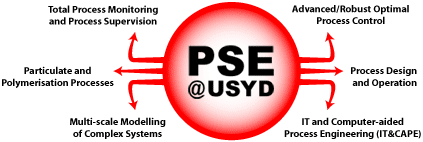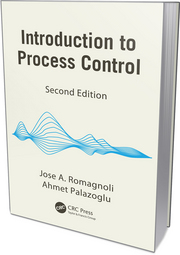
|
| Research Areas |
|
The following is a brief overview of the key areas
of expertise (both the theoretical and application-oriented
aspects) within the PSE group. What makes the PSE@LSU
unique is its ability to integrate these areas into
devising innovative solutions for highly complex systems.

| Total process monitoring and process supervision |
The advent of faster and more reliable computer systems has
revolutionized the manner in which industrial processes are
monitored and controlled. Once thought of as just data logging
and storage units, these computer systems now perform sophisticated
computer-based control strategies as well as real-time simulation
and optimization. These advances have resulted in the generation
of a large amount of process data, yet the task of interpreting
and analyzing this data is daunting; operators have neither the time,
nor often, the expertise to effectively monitor this information. The
PSEG is investigating an automated support system, which can manage
plant data and help make decisions about operational status.
The PSEG is aiming to create the theoretical framework, to develop and implement
an advanced Integrated Support System (ISS) for process monitoring,
data analysis and interpretation, event detection and diagnosis as
well as operations support for chemical and petrochemical manufacturing.
Related Projects:
- Robust Multi-scale Approach for Process Monitoring
- Integrated Supervision Systems
- Expert Systems in Polymerization Processes
- Robust Data Reconcelliation
|
| Multi-scale modelling of complex systems |
Multi-scale modelling addresses the construction of mathematical models via
the description of diverse physical and chemical phenomena occurring at
different space and time scales. While traditional process modelling has
experienced an enormous progress during the last decade, novel multi-scale
modelling methodologies and applications can potentially resolve some
obstacles in the scope and applicability of model-based technology during
the fore coming years.
PSEG has actively engaged with multi-scale modelling of complex and distributed
parameter systems within pilot-plant and industrial manufacturing facilities,
in an attempt to contribute towards a widespread of areas that range from nanotechnology
and product design to process operability and plant scheduling.
Related Projects:
- Production of Nanocrystals for Pharmaceutical Products
- Integrated Framework for Advanced Operation of Industrial Digesters
- Coagulation Studies in Polymerization Reactors
|
| Advanced/robust optimal process control |
In PSEG, linear model-based control techniques are developed and
implemented to ensure the advanced operation of pilot-scale process
facilities, while optimising nominal and transient process performance
without violating operating constraints. This is achieved by combining
state-of-the-art modelling and optimisation languages with modern
control system architecture for total process monitoring and control.
Additionally, PSEG actively researches into non-linear large-scale
model-based control of complex systems in an attempt to increase the
relevance of non-trivial control technologies that drive operational
constraints to an optimal state of process safety, environmental-friendliness
and profitability.
Related Projects:
- Optimal Model-based Control of Polymerization Reactors
- Optimal Model-based Control of Industrial Reactors
- Integrated Framework for Advanced Operation of Industrial Digesters
|
| Process design and operation |
The continual emphasis on energy saving and environmental protection
has driven process systems engineers, including design and operations
engineers, to involve a number of crucial steps in developing a design
of a chemical process. Process design teams are required to integrate
their designed processes to satisfy economical, environmental and social
objectives, while at the same time maintaining the process within a
satisfactory operational performance.
The PSEG aims to develop an overall integrated approach allowing all
relevant objectives to be formulated and accounted for during the
design/retrofit stages of a processing plant. We focus on developing a
general framework for such a methodology that incorporates economical,
environmental and operational performances for assessing various levels
of process integration for a given process.
Related Projects:
- Integration of Design and Control via Multi-objective Optimization
|
| IT and computer-aided process engineering (IT&CAPE) |
Multi-scale modelling addresses the construction of mathematical models via
the description of diverse physical and chemical phenomena occurring at
different space and time scales. While traditional process modelling has
experienced an enormous progress during the last decade, novel multi-scale
modelling methodologies and applications can potentially resolve some
obstacles in the scope and applicability of model-based technology during
the fore coming years.
PSEG has actively engaged with multi-scale modelling of complex and distributed
parameter systems within pilot-plant and industrial manufacturing facilities,
in an attempt to contribute towards a widespread of areas that range from nanotechnology
and product design to process operability and plant scheduling.
Related Projects:
- Integrated Supervision Systems
- Open Architectures for Advanced Real-time Operation
- Remote Operation of Pilot Facilities
|
|
This site is best viewed with version 5.0 browsers or above (IE & Netscape). www.pseonline.net |
 |
 Introduction to Process Control, Second Edition
Out Now!
Introduction to Process Control, Second Edition
Out Now!
|


